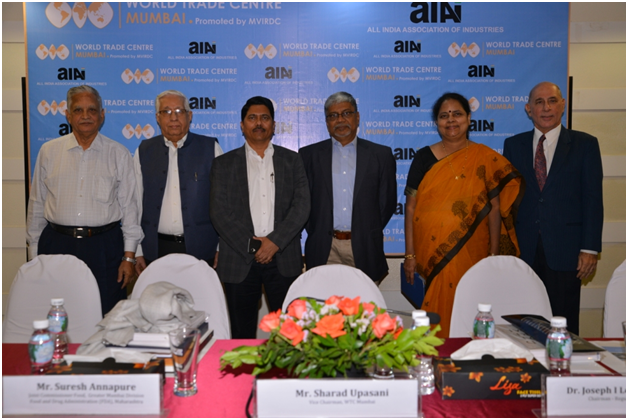“Food Safety Standards Act 2006 has undergone a change since its enforcement on August 5, 2011 with a shift from ‘adulteration’ to ‘safety’. The Act has an educative approach with friendly legislation. It has a penalty system for contamination and substandard foods. Unsafe foods would face prosecution. Food and Drug Administration (FDA) Maharashtra has 7.7 lakh licenses issued, which is the highest in India at 36 per cent. This was possible since FDA Maharashtra organized different camps to bring about awareness of the Act. The first online pilot project was held in Mumbai and Thane offices. On the April 15, 2014 100 per cent licenses was achieved”, said Mr. Suresh Annapure, Joint Commissioner – Food, Greater Mumbai Division, Food and Drug Administration (FDA), Maharashtra, who was the Guest of Honour at the event, during an interactive session on ‘Innovative Food Products in India – Regulators Role’ jointly organized by MVIRDC World Trade Center and the All India Association of Industries.
Elaborating further on the Act, Mr. Annapure said that the procedure for issuing licenses was now available online, providing transparent and time bound activities. On a futuristic note, he added that, he was looking forward to work hand-in-hand with industries especially with the ‘Make in India’ campaign, in order that consumers get wholesome food, thereby making the people of India healthy.
Mr. M.M. Chitale, Consultant in the Food Industry was the moderator of the event introducing the panelist for further discussion on the subject.

Dr. Joseph I Lewis, Chairman-Regulatory Affairs Committee, Protein Foods and Nutrition Development Association of India (PFNDAI) deliberated on the topic ‘Product Development – Concerns & Expectations’. He said food regulations were about balancing food diversity with safety practices. India is abundantly blessed with 52 per cent cultivable land (11 per cent world average) with 46-60 different soil types and 15 major climates all conducive to producing a variety of agricultural commodities. However, innovation provided the challenge from converting the agricultural commodities to processed foods. Prevention of Food Adulteration Act, 1954 provided a mere framework for combating adulteration while Food Safety and Standards Act 2006 widened the scope of the law to include a risk framework. What needs to be achieved is the harmonization in the processes of standardization, adulteration and innovation. He opined for freedom to innovate while adhering to safety measures. The Indian law does not take into consideration safety of the foods when adulteration is assessed. While clarifying what propriety foods are, Mr. Lewis said that they are not a category of food by itself but represents an enabling ‘provision’ in food law. Innovating with safety is a provision made in FSSA 2006.
Mr. Prabodh Halde, Head Technical Regulatory, Marico Ltd addressed the issue on ‘Impact of FSSAI regulation on Food Industry’. Mr. Halde said that India could be a leading food supplier of the world if the production side of agriculture were taken care of in an optimal manner. Owing to the fact that India is one of the producers of perishable commodities, it is important to gear up the food processing industry which is still in the nascent stages valued at 4 lakh crore. Inspired by the Modi Mantra, he said that regulatory role of the food industry should also work within the framework of the ‘Make in India’ campaign, with ‘Minimum Government and Maximum Governance’ and a ‘Single-window Clearance. Thereafter, he provided a detailed presentation on FSSAI. He explained the importance of packaging and labeling. Licensing and registration of food business is mandatory and there is a framework to monitor it, while detailing out the procedure. He also spoke on the categories of food and elaborated on compliances and penalties.
Dr. Laxmi Ananthanarayan, Associate professor, Department of Food Engineering and Technology (DFET), Institute of Chemical Technology (ICT) spoke on the topic ‘Ensuring Food Safety and Quality through Advanced Technology. She said that food needed to be standardized, safe for consumption, acceptable from sensory view point and nutritious. Markets for food are now global giving ample scope for contamination with the arrival of genetically modified foods. This gives rise to good manufacturing practices. Quality of food is not always visible and so food quality and food safety are interdependent. She emphasized that FSSA law should provide specification on consumer protection. There should be production specification and scope for value-addition with changing lifestyle and access to variety of food. She opined that adapting to emerging and advanced technologies was the solution. She enumerated the various preservations processes available worldwide, elaborating on the ones that could be adopted in the Indian context such as aseptic processing and packaging, modified atmosphere packaging and microwavable packaging to name a few. Enzymes also played an important role in food processing. Many upcoming technologies are available yielding good quality, safe and shelf stable products.
Earlier in a welcome address, Mr. Sharad Upasani, Vice Chairman, MVIRDC World Trade Center said that the Indian food processing industry is a sunrise industry estimated to be US$ 67 billion, employing 13 million people directly and 35 billion indirectly. He added that value addition of food products is expected to increase from 8 to 35 per cent by end 2025. Regulations for the industry are crucial giving rise to the Food Safety and Standards Act 2006. The law provides safety standards for scientific processes, manufacturing, storage, distribution, sale and import, thereby ensuring safe and wholesome food for human consumption.
Mr. Firoze B. Andhyarujina, Senior Advocate, Supreme Court India, proposed the Vote of Thanks.
Thereafter, the floor was open to a question and answer session.

 : +91 7718886506
: +91 7718886506